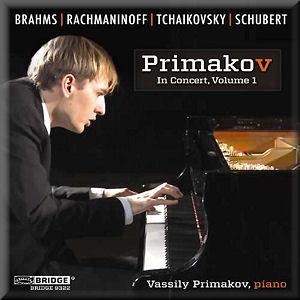 |
 |
|


alternatively
CD:
MDT
AmazonUK
AmazonUS
|
Primakov - In Concert, Vol.1
Johannes BRAHMS (1833-1897)
Two Chorale Preludes from Op.122, arr. Busoni (1896) [5:59]
Franz SCHUBERT (1798-1828)
“Wanderer” Fantasie, Op.15 D.760 (1822) [21:58]
Pyotr Ilyich TCHAIKOVSKY (1840-1893)
Album pour enfants, Op.39 (1878) [27:55]
Sergei RACHMANINOV (1873-1943)
Sonata No.2 in B flat minor, Op.36 (1913, rev.1931) [19:43]
 Vassily Primakov (piano)
Vassily Primakov (piano)
rec. 2002 (Schubert), 2004 (Rachmaninov), 2006 (Tchaikovsky), 2007 (Brahms). DDD
 BRIDGE 9322 [75:53]
BRIDGE 9322 [75:53] 
|
|
|
In the liner-notes, the producer David Starobin relates how
he became interested in the pianist Vassily Primakov and obtained
his concert tapes. Apparently, he was so impressed, that he
started a series of Primakov’s concert recordings. The pianist
is shown “in the formative stage of his professional career”,
when he was 22-27 years old. I wholeheartedly share Starobin’s
enthusiasm and thank him for this excellent compilation.
The two Chorale Preludes, originally written for organ,
are among Brahms’ last works. The shadow of Bach lies heavily
on them. Busoni’s arrangement of Ich ruf zu dir, Herr Jesu
Christ comes especially to mind. I feel an excess of Romantic
strain in the performance: this music would benefit from a more
austere presentation. Primakov tries to say more by saying more.
The music speaks of old age, its grief and fatigue. The first
prelude is more sighing and pensive, the second more singing
and yearning. The acoustics are reverberant, which adds to the
organ-in-church feeling.
Primakov gives us a rather heavy-loaded reading of the great
Wanderer Fantasy. In his hands it sounds more Schumann
than Schubert, proud and reckless, with excellent drive, structural
clarity and unbeatable excitement. In the first part, he revels
in the stormy passages and hurries through the quiet ones to
dive into another whirlwind. However, the Adagio part
is expressive. Its drama and menace are very real, and the lyrical
passages are deeply felt. The third part is light and waltzy,
and its joy sincere. The ending is powerful and triumphal. All
the bells, big and small, are ringing. It is very impressive,
despite some shouting. This is a young man’s Wanderer.
As is often the case with Primakov’s interpretations, it’s an
eye-opening experience.
Tchaikovsky’s Children’s Album is the Bible for Russian
piano students. Although it is easy to play, it is a real treasure-chest
of musical riches. In its beauty and lyrical inventiveness it
can be compared to The Nutcracker and The Seasons.
Like Schumann in his Kinderszenen, Tchaikovsky shows
us the world through the eyes of a child. We see a boy and a
girl, each with his toys and joys. Primakov gives us a coherent
and sympathetic picture. In the beginning, he seems to be in
a hurry to get through it: he does not relish the lyrical moments.
The Waltz and The New Doll are rather mechanical.
Maybe the pianist felt more affinity with the boy’s world? Towards
the end, seeing that everything goes well, he calms down, and
the closing numbers are magical. The national songs and dances
in the middle are also well characterized.
Finally, we have an extrovert and dramatic reading of Rachmaninov’s
monumental Second Sonata. The first movement is muscular
and impatient. All the mirrors glitter, and all the fires ablaze.
The slow movement pours out, with its balmy harmonies and nostalgic
glow. Its big climaxes might be a little overdone – but they
are overdone with such enthusiasm that I’m totally won over.
The third movement is Rachmaninov at his most ecstatic. Primakov
rides this fiery lion, showing no trace of tiredness. The wild
ride ends in fireworks. The overall structure of this large
piece is very clear; Primakov never lets us lose our path amid
the distracting details.
The disc provides exciting and stimulating listening. The program
combines several works of great beauty, some of them rarely
heard. Primakov is excellent in the Romantic repertoire, and
here he fully demonstrates his understanding of the music and
brings this understanding to the listener. As David Starobin
points out in the liner-note, Primakov has the “ability to reach
deeply into a score, marshal its details, and capture the work’s
spiritual essence”. The recording quality may not be absolutely
perfect, but it is clear enough for a concert tape. There are
no audience noises, except for well-deserved bursts of applause.
Oleg Ledeniov
|
|












